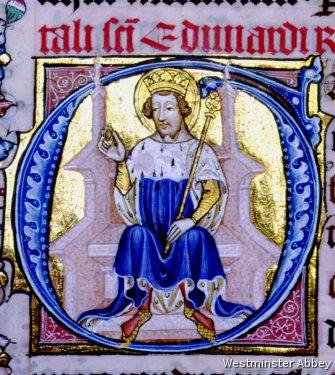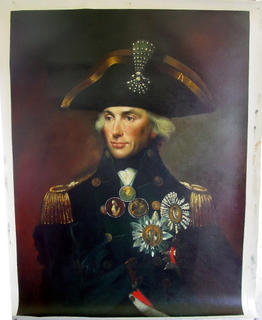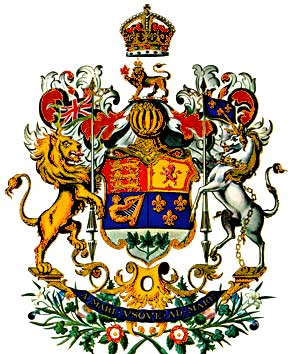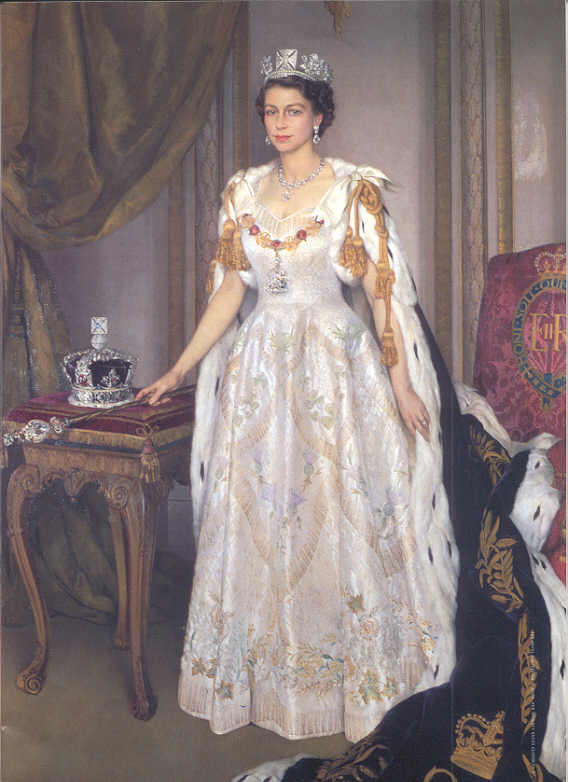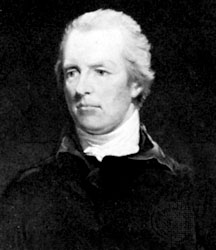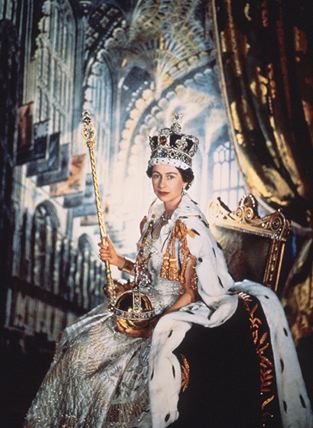[+] HONOURING OUR PATRON, SIR WINSTON CHURCHILL, VICTOR OF THE ENGLISH-SPEAKING PEOPLES
[+] HONOURING OUR QUEEN, ELIZABETH THE SECOND, ON THE 80TH YEAR OF HER BIRTH (1926 - 2006)
[+] HONOURING OUR KING, SAINT EDWARD THE CONFESSOR, ON THE 1000TH YEAR OF HIS BIRTH (1005 - 2005)
[+] HONOURING OUR HERO, LORD NELSON, ON THE BICENTENNIAL OF THE BATTLE OF TRAFALGAR (1805 - 2005)
[+] HONOURING OUR SONS, THE QUEEN'S COMMONWEALTH SOLDIERS KILLED IN THE 'WAR ON TERROR'
[+] HONOURING OUR VETS ON THE 150TH ANNIVERSARY OF THE VICTORIA CROSS (1856 - 2006)
Republics are bloodless abstractions. We all know this. We all know they are founded upon conceptual notions such as equality, fraternity and liberty, rather than the more tangible drivers that are the soul of monarchies, like human connection, continuity and experience. As Andrew Coyne wrote in a 1998 column, the Queen is more than the personification of state; she is the humanization of it. Republicans and nationalists might complain that our head of state is an absentee and “foreign” landlord, instead of a living national presence, but let no-one be fooled: republicans rally around the flag, very rarely the person in office.
So it is a strange thing indeed to hear them talking about “patriating the monarchy”, as they did in a Globe and Mail editorial the day after the Queen turned 80:
The Queen’s 80th birthday is an occasion to admire her record as monarch and wish her long life and happiness. But it is also a time to think about what happens when her reign ends. This paper has long argued that, after her passing, Canada should choose its own head of state.
Though many Canadians feel great affection for the Queen and the Royal Family, the time has passed when the monarchy was a meaningful part of our national life. Sharing our head of state with a foreign country after 138 years of nationhood is an anachronism, not fitting with our present reality as a modern, multicultural country.
There is no need to declare a republic. The Governor-General could be chosen in some novel, Canadian way – perhaps, as suggested here before, by the Companions of the Order of Canada. Whatever the method, he or she, not a British monarch, should be our next head of state.
There is no need to declare a republic. Telling, isn’t it. Translation: we’d like to, but that would be too difficult, both constitutionally and democratically. Better to sidestep the people on that one. Better to suffocate the monarchy ever so slowly and by stealth until we become a republic in all but name. They might call it “patriating the monarchy”, but we all know this is code for republicanizing it. The end result of a crownless GG as head of state would be no different than that of a powerless president - people would quickly lose interest.
Obviously if you’re going to patriate the monarchy, you have to patriate the monarch - otherwise, you’re faking it. If Canada, Australia, New Zealand, Jamaica…want to get together and decide who gets Prince Harry, Prince Edward and Prince Andrew etc, then I’m all ears. But anything less dehumanizes the state and cheapens our national heritage. We would lose a valuable focal point of our unity, that sense of connectivity and gravitas that only monarchs and a thousand year old Crown can bring. Robbing us of the Crown and all that it represents would send us further down the path of banality, one where corporate logos and national branding are increasingly ruling the day. This must not happen. If we are serious about patriating the monarchy, then we should not abolish the monarch. We should abolish the GG.
Just thought you should know that Harper is now on day 80 of his premiership, and already he has overtaken two former prime ministers in tenure. John Turner lasted 79 days back in 1984.
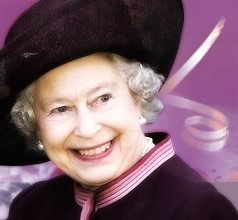 You know republicanism is weak in Canada when the republicans start talking about “patriating the monarchy”. Ever since the Queen’s 80th, the Globe and Mail has been all the rage. They do this because they know that changing Canada into a Republic is constitutionally impossible. A referendum win alone is not enough to remove the maple Crown from the Canadian Constitution: in this country, you need complete federal unanimity, meaning the consent of the House and Senate, as well as the binding approval of the legislatures of each of the ten provinces, not to mention the Queen herself. The Premier of tiny Prince Edward Island need only give Ottawa the bird, and the game is up. Trust me when I say that the constitutional amending formula has been a gift to loyalists ever since the Constitution was patriated from the United Kingdom in 1982. Only the politically ignorant, and the most radically demented nationalist republicans, would think they actually have a winning shot.
You know republicanism is weak in Canada when the republicans start talking about “patriating the monarchy”. Ever since the Queen’s 80th, the Globe and Mail has been all the rage. They do this because they know that changing Canada into a Republic is constitutionally impossible. A referendum win alone is not enough to remove the maple Crown from the Canadian Constitution: in this country, you need complete federal unanimity, meaning the consent of the House and Senate, as well as the binding approval of the legislatures of each of the ten provinces, not to mention the Queen herself. The Premier of tiny Prince Edward Island need only give Ottawa the bird, and the game is up. Trust me when I say that the constitutional amending formula has been a gift to loyalists ever since the Constitution was patriated from the United Kingdom in 1982. Only the politically ignorant, and the most radically demented nationalist republicans, would think they actually have a winning shot. The talk of patriating the monarchy should relieve us of a prevailing myth - one we commonly hear and say – that the countries of the Crown Commonwealth are each, in their own right, in relation to one another, totally sovereign independent nation-states. This is inaccurate because no matter how you parse our independence, we still owe mutual allegiance to the same constitutional monarch. Clearly, each of us cannot be uniquely independent if we are represented by the same sovereign – one cannot be separately independent if one is also collectively joined. In the long evolution from British colony to self-governing dominion to constitutionally independent nation-state, our full independence and sovereignty is still happily stymied by the fact that under Queen Elizabeth II, the Commonwealth Realms are in “personal union” with the United Kingdom.
Wikipedia defines a personal union as a “political union of two or more entities that, internationally, are considered separate states, but through established law, share the same head of state”. What this says is that our situation today is notionally no different than what occurred in 1603, when James VI of Scotland also became James I of England. At that defining moment in British history, two separate kingdoms lost their singular independence vis-à-vis each other, as a result of being politically joined under a single monarch; a merger that became further cemented over time until finally, both kingdoms were abolished and combined into the United Kingdom under the Union Act of 1707. The “only” difference between 1603 and now is the evolved nature and limited power of Her Majesty, compared to that of her 400 year-old predecessor, one that leads us to erroneously believe that we are somehow absolutely independent, even though we share the same sovereign.
Because of this, because our countries are in personal union with the UK and the UK with us, it would not be incorrect to refer to this sovereign amalgamation as the “United Kingdoms of the Commonwealth”. One merely need give it a name. For most, the mutual allegiance of the nations of the British Commonwealth may be of little or merely of symbolic and sentimental importance, but at this pivotal moment in our history, at a time when the men and women of our Commonwealth military forces are engaged throughout the world in difficult and dangerous tasks in our collective security and defense, would it be so much to consciously embrace the ties that bind, to deliberately play up our fundamental adherence to a shared set of evolved core beliefs and principles? Beyond these mutually held values, would it be so much to engage each other more closely, such as endorsing a Commonwealth Free Trade Agreement? Would it be too much to open our minds, our skies and our markets? Would it be too much to enhance the mobility rights of our peoples, to reciprocate joint citizenship and recognize joint loyalty to a common sovereign? Would it be so much to have a vision, to pool our sovereignty in a few select areas? Or must national independence in the 21st century be forever hidebound, insular, parochial and uninspiring?
Next Post: Patriating the Monarchy
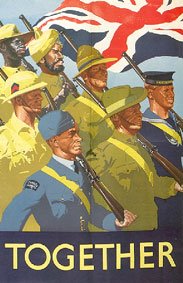 Six more of Her Majesty's soldiers have been killed in the line of duty over the past week in Afghanistan and Iraq: 4 Canadians, 1 Australian and 1 Brit, all of whom have been permanently added above in our drop-bar commemoration scroll. Apparently another 8 Americans also were killed in Iraq over the weekend, most from those bloody roadside bombs that our enemy bastards keep planting. Death to the Taliban and any terrorist who thinks they can dent our steely resolve. If Prince Harry is any indication of that resolve (read: let me fight, or I quit), the Taliban are in deep trouble. Like St. George and the Legenda Aurea, Prince Harry with lance in hand represents just the fighting spirit needed to slay the Taliban dragon. Here's honouring our fellow soldiers who paid the ultimate sacrifice this week, so that others might live in peace and security from the region's warlord fanatics:
Six more of Her Majesty's soldiers have been killed in the line of duty over the past week in Afghanistan and Iraq: 4 Canadians, 1 Australian and 1 Brit, all of whom have been permanently added above in our drop-bar commemoration scroll. Apparently another 8 Americans also were killed in Iraq over the weekend, most from those bloody roadside bombs that our enemy bastards keep planting. Death to the Taliban and any terrorist who thinks they can dent our steely resolve. If Prince Harry is any indication of that resolve (read: let me fight, or I quit), the Taliban are in deep trouble. Like St. George and the Legenda Aurea, Prince Harry with lance in hand represents just the fighting spirit needed to slay the Taliban dragon. Here's honouring our fellow soldiers who paid the ultimate sacrifice this week, so that others might live in peace and security from the region's warlord fanatics: 80 REASONS TO BE LOYAL AND HONOUR THE QUEEN
WORD OF CAUTION: TO BE READ BY REPUBLICAN MISFITS, FEEBLE HOSTILES AND PREENING MALCONTENTS AT THEIR OWN PERIL. I AM REMORSELESSLY PRONE TO RAPTUROUS THUNDER AND DEMENTED EXTRAVAGANCE ON SUCH OCCASIONS. YOU’VE BEEN FOREWARNED.
______________
I declare before you that my whole life, whether it be long or short, shall be devoted to your service and the service of the great Imperial Commonwealth to which we all belong.
- Elizabeth Windsor on her 21st Birthday, April 21, 1947.
TO THE QUEEN'S MOST EXCELLENT MAJESTY
May it Please Your Majesty, Most Sacred and Gracious Sovereign:
 WE, Your Majesty's affectionate, patriotic and loyal subjects, peopled over the Earth's palm and pine, from all parts of your ancient lands, sovereign territories and ample dominions, separated by nations strong, independent, prosperous and free, yet fraternally united under one glorious Commonwealth Kingdom, joyfully extend to Your Majesty, on this momentous occasion, a very happy 80th birthday.
WE, Your Majesty's affectionate, patriotic and loyal subjects, peopled over the Earth's palm and pine, from all parts of your ancient lands, sovereign territories and ample dominions, separated by nations strong, independent, prosperous and free, yet fraternally united under one glorious Commonwealth Kingdom, joyfully extend to Your Majesty, on this momentous occasion, a very happy 80th birthday.Madam, we can think of 80 reasons to celebrate and honour you on your birthday. This year marks the fifty-fourth of your reign. Through it all, you have conducted yourself with unrequited grace(1), dignity(2) and duty(3) to all your peoples, and for that we congratulate and salute you. You have been unfailingly poised and devoted(4), respectful(5), kind(6) and loyal(7) throughout a lifetime of public service(8), even when such attributes have been less than fully reciprocated(9).
We give thanks to your example as a defiantly ordinary(10), genuine(11) and modest(12) person, and for having nothing in common, apart from your obvious fame, with our debased, celebrity-crazed culture(13). You have been an outstanding model of humility(14), civility(15), discreteness(16) and authenticity(17) in a deprived world – an antidote, if you will, to all that is fake, mean, selfish and contemptible(18). In this, for succeeding in being yourself, Your Majesty has kept open the path to true reverence(19).
You are the symbol of all that is good(20), and decent(21), and stable(22) in our tradition. Your Majesty is a human link(23) at the end of a proud history(24) and ancient heritage(25), stretching back several centuries, even millennia(26). You exemplify permanence(27) and continuity(28) in a changing world, a rock in the fleeting midst of time. Trends pass; movements wither; institutions reform; fashions go out of style; governments fall; politicians come and go; rock stars become knights…every silly season returns to nature, as each modern era, in turn, gets replaced by another – yet, through it all, you remain(29). We smiled over the decades as the priesthood of modernity proclaimed your irrelevance, only to watch their own relevancy, in due course, wilt under the steel of your steadfastness and stiff upper lip(30). We commend you for your calm(31), for continuously confounding your enemies, and for ignoring the fashionable desires of feeble men.
For it is the immortality of Your Majesty's Crown that inspires us(32). You are the link in the chain of eternity that connects the present to generations past and future(33). The Crown and all that you represent is a glorious treasure to be held in trust and preserved forever. It is stupefying why any in today's generation would not wish this, why they would declare your permanence, outdated; your functions of state, useless; your royal person, irrelevant. It is stupefying because you are undeniably, unavoidably and inextricably at the centre and forefront of national life(34). The whole constitution and apparatus of government operates solely under your authority and in your name(35). We respect you because you are the People's Sovereign, because you exercise authority and responsibility over power, because you reign out of a selfless sense of duty, not rule out of an inflated sense of ambition(36). We firmly hold that a people’s respect in a democratic age can never be outdated, useless or irrelevant(37).
Your Majesty is nonetheless more than an influential figurehead(38) - you are the world’s most experienced statesperson(39), universally admired abroad(40) and, when it truly matters, reservedly powerful at home(41). Under extraordinary circumstances, you can withhold Royal Assent, dismiss Prime Ministers and dissolve Parliament, a prerogative reinforced by historical precedence within your own lifetime: recall the sacking of Canadian Prime Minister McKenzie-King in 1926, or Australian Prime Minister Gough Whitlam in 1975, both of whom challenged the Crown’s authority to their own political peril. Just ask British Prime Minister Tony Blair what happened last year when you wisely counseled him over the government’s plans to pursue further integration under a European Constitution; how it could violate your oath and encumber your ability to carry out your solemn responsibilities, in which you swore to “govern the Peoples of the United Kingdom… according to their respective laws and customs”(42). [Emphasis added]. It is joyfully clear to us, Madam, that you take your vows seriously(43), that when push comes to shove, you are the ultimate guardian of our freedoms(44), rights(45) and values(46), the embodiment of our unity(47), independence(48) and sovereignty(49), above politics(50), answerable only to God and your own conscience(51). For this, we salute you, and place our trust.
For 54 remarkable years, you have faithfully abided by your coronation oath, you have kept your promises(52). It is amazing how in all that time, we cannot think of a single occasion – not one - in which you, your royal self, put a foot wrong or said anything that might damage the reputation of the institution that you represent in any way, shape or form(53). In all that time, you have upheld the beauty(54), splendor(55) and sanctity(56) of your Throne, and for that, we admire you. It is also amazing how the religiously ignorant go on about the separation of Church and State with mindless ferocity, evidently oblivious that you head the Church and personify the State(57). They forget that you were more than just democratically confirmed, recognized and proclaimed Queen Regnant by all your Parliaments(58). Your Majesty is, by law, the Defender of the Faith(59). You are a Christian Prince, who sat upon the Stone of Scone, the stone of destiny. You were enthroned upon King Edward's chair, the great seat of the Anglo-Saxon Saint and Confessor. You were anointed with holy oil, hallowed and consecrated unto God(60). You were crowned, acclaimed, and accepted, by right of blood succession(61) – you were lifted up above us "by the power, authority and ordinance of Almighty God"(62). For that, we praise you, and Praise God.
For the believing, your person is sacred and inviolable. For the less believing, you represent the myth and fairy tale, but most, by and large, measure their belief in what you do, how you show up every day and, without fuss, do the work(63), even well after the age of permanent retirement(64). You bring us together in ceremony and national remembrance; you commission countless edifices, commemorate anniversaries and celebrate achievement(65). You recognize and pay tribute to our bravery and heroism, our volunteerism, our distinguished service and good works(66). With pomp and pageantry, you lift us out of the drudgery of administration and process, out of the seemingly pointless utilitarianism of our detached lives(67). You unite us like a family. You are bonded to your people, and we to you in language, law, history, culture, institutions and love of our shared Queen(68).
We are also united by what you are not, Madam. As columnist Elizabeth Nickson put it: You and your family are not movie stars, you are not extra smart, you are not “special”(69)…you represent the values of ordinary middle-class families all over the world, who are restrained(70), sensible(71), kind, practical(72), steadfast, penny-pinching(73), punctual(74), dutiful, charitable(75), trustworthy(76) and good. These are the values we must celebrate and promote, because these are the values, and no others, that make our lives possible(77); not the awful cor'uptions of Hollywood(78) or the "I'm so clever I must run your life" egomania of [politicians](79). That's why we must keep the Windsors in perpetuity. That's why by ridding ourselves of Your Majesty and all that you represent, we would be forsaking one of our last great role models in the world, one who embodies the mainstream values of our culture upon which our free and virtuous society depends(80).
And so because you are our Queen, and because you are virtuous, Your Majesty, on your 80th birthday, we, and your peoples around the world salute you.
With True Allegiance and Undying Affection, We Have the Honour to be,
Your Majesty’s Most Loyal and Humble Servants.
LONG LIVE THE QUEEN!
 That didn’t take long. It remains to be seen what kind of prime minister Harper ends up becoming, but one thing is for certain: as of today, he won’t be the shortest serving. That record belongs to Sir Charles Tupper, just 69 days in office. As a Father of Confederation (Nova Scotia), Tupper had a distinguished record of public service, but he is the least successful of our prime ministers. Even though the old war horse (he was also the oldest PM in history at 74) could command a room and championed the most progressive reforms of his day, he was unfortunately more famous for his reckless private life. The “Ram of Cumberland” was notorious as a womanizer, so nicknamed owing to his forceful character and the manner of his sexuality. Absolutely scandalous by the Victorian standards of the 1890s. It would probably be an understatement to call him the Bill Clinton of his day.
That didn’t take long. It remains to be seen what kind of prime minister Harper ends up becoming, but one thing is for certain: as of today, he won’t be the shortest serving. That record belongs to Sir Charles Tupper, just 69 days in office. As a Father of Confederation (Nova Scotia), Tupper had a distinguished record of public service, but he is the least successful of our prime ministers. Even though the old war horse (he was also the oldest PM in history at 74) could command a room and championed the most progressive reforms of his day, he was unfortunately more famous for his reckless private life. The “Ram of Cumberland” was notorious as a womanizer, so nicknamed owing to his forceful character and the manner of his sexuality. Absolutely scandalous by the Victorian standards of the 1890s. It would probably be an understatement to call him the Bill Clinton of his day.Harper is on the move (see three posts below). In just 10 days from now he will surpass John Turner’s stint, followed by Kim Campbell and Joe Clark. Bets are that before his minority is up, he will have overtaken all the flash in the pan fluff that marked the tenure of our lesser Right Honourables. The bigger question is whether he will prove merely a managerial steward of the country (like Chretien), or one of the very few truly transformative leaders we've had from MacDonald to Mulroney. Methinks the latter, but only time will tell. At 40% in the polls though, things are definitely looking up for the man that is only on day 70 of his new job.
Though the average educated adult, apparently knows only between 24,000 and 30,000 of them. Interesting.
Hat Tip: Nealenews.
ON THIS DAY IN HISTORY
April 12, 1606
ROYAL DECREE
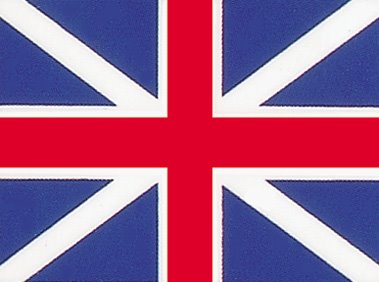 WHEREAS English sailors resent the Scottish colours, and Scots scorn the cross of St. George, I, James, King of Great Brittaine, France and Ireland, Defender of the Faith, etc, do hereby royally decree that "All our subjects in this our isle and kingdom of Great Brittaine and the members thereof, shall bear in their main top the red cross commonly called St George's Cross and the white cross commonly called St. Andrew's Cross joined together according to a form made by our heralds and sent to our Admiral to be published to our said subjects".
WHEREAS English sailors resent the Scottish colours, and Scots scorn the cross of St. George, I, James, King of Great Brittaine, France and Ireland, Defender of the Faith, etc, do hereby royally decree that "All our subjects in this our isle and kingdom of Great Brittaine and the members thereof, shall bear in their main top the red cross commonly called St George's Cross and the white cross commonly called St. Andrew's Cross joined together according to a form made by our heralds and sent to our Admiral to be published to our said subjects".Note: Only that which is in quotations, is verifiably in the Royal Decree of April 12, 1606. I have not been able to find the full text anywhere on the Net. But today is the 400th anniversary of the Union Flag, as a result of the personal union of the Crowns of England (James I) and Scotland (James VI), and the need to settle the confusion over a flag to represent the King's ships at sea.
Rule Britannia!
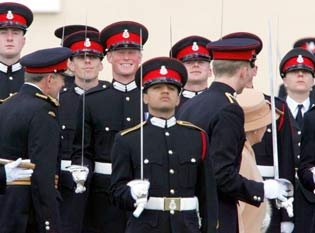 Prince Harry of Wales received the Queen's commission today, graduating as a 2nd Lieutenant in the Queen's Household Cavalry, Blues and Royals Regiment.
Prince Harry of Wales received the Queen's commission today, graduating as a 2nd Lieutenant in the Queen's Household Cavalry, Blues and Royals Regiment. He will train to become a troop commander, in charge of 11 men and four light tanks, and could serve in a conflict zone. Senior officer Maj Gen Sebastian Roberts said it was "eminently possible" the young royal could find himself serving in Iraq or Afghanistan.
Congratulations, Harry!
For more, see the Queen's inspection parade in pictures.
I've always wanted to do this, so here it is. This ranking will be followed in time by one for British PMs, American Presidents and Anglo Sovereigns. I think we non-experts can quite easily rate the political success of statesmen if we understand that a leader's tenure first falls under one of the three Ts: transformational, transactional or transitional. A transformative leader, for better or worse, makes a substantial impact on the national progress of his country. A transactional leader is a caretaker of sorts, one who may know how to win power, but not what to do with it. Such a leader is more famous for his personality and style, than for any meaningful accomplishment while in office. And transitional leaders have the briefest of tenures (under 2 years), who are noticeably inadequate and found wanting in some regard. Equally inconsequential, this group can only be differentiated and ranked according to the number of days, weeks or months in power. That out of the way, here then, in my opinion, are the Prime Ministers of Canada rated from historically best to worst:
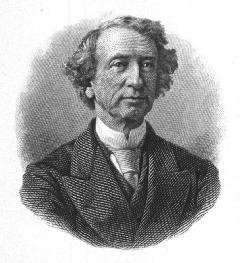 Transformational Prime Ministers (measured by substance)
Transformational Prime Ministers (measured by substance)1. Sir John A. MacDonald, Con (Confederation)
2. William Lyon McKenzie-King, Lib (WW2)
3. Sir Wilfred Laurier, Lib (Development & Expansion)
4. Sir Robert Borden, Con (Great War)
5. Brian Mulroney, Con (Free Trade)
6. Pierre Trudeau, Lib (Constitution & Charter)
7. Lester Pearson, Lib (Flag, Healthcare, Peacekeeping)
Transactional Prime Ministers (measured by style)
8. John Diefenbaker, Con (Traditionalist/Populist)
9. Louis St. Laurent, Lib (Sound/Sensible/Dutiful)
10. Jean Chretien, Lib (Folksy/Low Expectations)
11. Alexander McKenzie, Lib (Honest/Unimaginative)
12. Richard Bennett, Con (Impersonal)
13. Arthur Meighen, Con (Eloquent/Principled)
14. Sir John Thompson, Con (Loyal)
Transitional Prime Ministers (measured by spell)
15. John Abbott, Con (1 year, 5 months)
16. Sir MacKenzie Bowell, Con (1 year, 4 months)
17. Paul Martin, Lib (1 year, 2 months)
18. Joe Clark, Con (8 months, 26 days)
19. Kim Campbell, Con (4 months, 12 days)
20. John Turner, Lib (79 days)
21. Sir Charles Tupper, Con (69 days)
Full disclosure: I’m a diehard Tory and a staunch traditionalist, so you are entitled to read into any bias that you believe might have affected my choice of ranking. Note though that I did struggle on a number of fronts. For example, it is debatable whether Trudeau should rank higher or lower than Mulroney. They both had a major impact - perhaps it would have been fairer to place Trudeau higher, particularly on the unity front. But Mulroney was much stronger on the economy and foreign affairs. Similarly, Laurier and King. Personally, I much prefer Arthur Meighen over King, but all the eloquence in the world couldn’t win Meighen lasting power. Some may feel Chretien should rank higher, given his three consecutive majorities. But what did he do, other than almost lose the country? It was especially painful to rank Pearson ahead of Diefenbaker, because Pearson more than anyone vandalized our heritage and institutions (Red Ensign, RCN, RCAF), whereas the Chief upheld the greatest respect. However, Pearson gave Canada its modern character, and reality requires that we recognize the impact this had, however insidious.
All that being said, watch for Harper over the next dozen or so years to eventually move into the number 2 spot. Remember, you heard it here first.
Fun fact: Sir John Thompson, while PM of Canada, died in Windsor Castle after receiving a knighthood from Queen Victoria. He was 49.
Here are 80 facts about the Queen released by Buckingham Palace to mark her 80th birthday.
ON THIS DAY IN HISTORY:
April 9, 1917
 On Easter Monday at 0530 hours (in the morning), the greatest artillery barrage in military history opened up on Vimy Ridge. In the space of an hour and forty minutes, six million shells - three thousand per second - were thrown onto German positions atop the muddy scarp. "The wall of sound, like ten thousand thunders, drowned out men's voices and smothered the skirl of pipes...as if a hundred express trains were roaring overhead...tons of red-hot metal hurtling through the skies caused an artificial wind to spring up, intensifying the growing sleet storm slanting into the faces of the enemy. The earth reverberated for miles around, as in an earthquake, and the faint booming of the guns was heard by David Lloyd George, the British Prime Minister, at Downing Street in London." - Pierre Berton, Vimy.
On Easter Monday at 0530 hours (in the morning), the greatest artillery barrage in military history opened up on Vimy Ridge. In the space of an hour and forty minutes, six million shells - three thousand per second - were thrown onto German positions atop the muddy scarp. "The wall of sound, like ten thousand thunders, drowned out men's voices and smothered the skirl of pipes...as if a hundred express trains were roaring overhead...tons of red-hot metal hurtling through the skies caused an artificial wind to spring up, intensifying the growing sleet storm slanting into the faces of the enemy. The earth reverberated for miles around, as in an earthquake, and the faint booming of the guns was heard by David Lloyd George, the British Prime Minister, at Downing Street in London." - Pierre Berton, Vimy.With the Canadian Corps taking the whole of its objective under a daring, rolling forward tactic called the creeping barrage, British forces finally won their first offensive victory of the Great War. Between 1914 and 1916, the French hurled 20 divisions against the ridge in three separate failed attacks, squandering 150,000 men. The Canadians took it with four divisions, and suffered 10,000 casualties - by the standards of the day, a stunning success.
Like ANZAC Day for Down Unders, Canada felt it won its nationhood that day and went on to build the most impressive Allied monument of World War I in honour of its fighting soldiers. The Vimy Memorial stands tallest on the Western Front mourning our fallen sons, and represents more than 66,000 Canadians who sacrificed their lives in the Great War. Men who paid the ultimate price for Europe's sins and stupidity. Brave, young, adventurous, ordinary and heroic men who suffered that later generations might live in peace. Men who once felt dawn. Saw sunset glow.
EU slams the UK over voting British Commonwealth citizens living in Gibraltar. Puts EU voting rights of a million Commonwealth residents living in the UK at risk. Quote of the day:
“In order to kow-tow to the paranoia of the Spanish, Europe appears to be intent on discriminating against those from the Commonwealth, this must not be allowed to happen.”
- Roger Knapman, MEP
Story here, here and here.
'Sad and politically motivated':
"This opinion goes against over 100 years of British history. Britain elected its first Commonwealth citizen, an Indian national, in 1883...
"Britain has a unique and important relationship with Commonwealth citizens. Any such ruling from the Court of Justice should be revised before it causes damage."
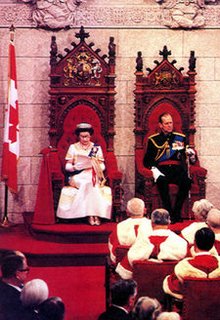 It’s official. Stephen Harper is the most deferentially loyal prime minister Canada has had since John Diefenbaker’s tenure ended in 1963. If there were any doubts about this beforehand – and believe me, I had plenty - yesterday’s historic Speech from the Throne on the opening of the 39th Parliament erased them all. As Rex Murphy put it, it might be the Queen’s Speech by authority and by tradition, but we all know who the ventriloquist is. Today’s editorial in the National Post encapsulates it best:
It’s official. Stephen Harper is the most deferentially loyal prime minister Canada has had since John Diefenbaker’s tenure ended in 1963. If there were any doubts about this beforehand – and believe me, I had plenty - yesterday’s historic Speech from the Throne on the opening of the 39th Parliament erased them all. As Rex Murphy put it, it might be the Queen’s Speech by authority and by tradition, but we all know who the ventriloquist is. Today’s editorial in the National Post encapsulates it best:The Throne Speech revealed a government that has not only an intelligent agenda, but also a healthy respect for the institutions that underpin our parliamentary democracy.
After years in which the fact of the Crown in Canada has been treated as an embarrassing anachronism, this government has shown no compunction about celebrating Canada’s monarchist system of government.
The tone was set by the use of the Royal Salute upon the arrival of Michaelle Jean, the Governor-General – which some functionaries have been trying to phase out – and it continued with the Throne Speech itself. The document made several references to the Queen, in particular by honouring her coming 80th birthday, a fitting tribute to a remarkable woman who has earned the respect and gratitude of all Canadians for her lifetime of service.
From Confederation, the convention was to make reference to the sovereign in the Throne Speech. This only makes sense, given the ancient origins of the speech, and the fact that it is derived from the authority of the sovereign. In recent years, however, this practice was quietly reduced and then eliminated entirely in the last two speeches under the Martin government. It might have been the “Speech from the Throne”, yet references to the Queen were assiduously avoided.
The current government has restored the tradition. Said the Governor-General: “Canadians rejoice in the coming 80th birthday of Her Majesty later this month, and in her more than 50 years of service to Queen of Canada.”
These are accurate statements both. And make no mistake about it: These words might have been mouthed by Ms. Jean, who also in the speech described herself correctly as “the representative of Her Majesty Queen Elizabeth II”, but they did not come from her. It is good to see a government that takes this country’s institutions seriously.
Indeed. I tip my hat unreservedly to Harper for this, for his very proper bow to our Queen. For only when a Prime Minister does this, does he truly bow before all of us.
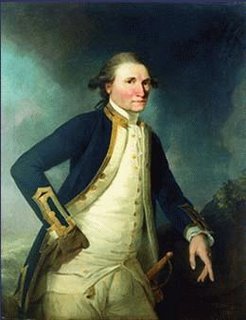 The United Kingdom lowers Union Flag in Tonga. China moves in. From the Daily Telegraph:
The United Kingdom lowers Union Flag in Tonga. China moves in. From the Daily Telegraph:As the British pull out of a region they have dominated since the voyages of Captain James Cook more than 230 years ago, China is flexing its strategic and economic muscle beyond its traditional sphere of influence...
China's interest is three-fold: to compete with Taiwan in securing the diplomatic allegiance of island states, to secure raw materials such as timber, gas and gold, and to challenge Western powers such as Australia, New Zealand and the United States, which have gradually tried to bridge the gap left by Britain...
"It's clear that China wants to be the hegemon of the region," said Miss Windybank. "In the future that may include a military presence, as they expand the capabilities of their navy.
"Britain is no longer a player in the Pacific, nor does it want to be. It's the end of an era." Tony Blair acknowledged the shift during his official visit to New Zealand last week. He discussed the impending Chinese summit with his counterpart, Helen Clark, and told her that from now on Britain will have to rely on New Zealand as its eyes and ears in the region.
But Mr Blair will be disappointed if he thinks New Zealand can act as a regional gendarme - Wellington scrapped the combat capability of its air force four years ago and its navy is small.
Prime Minister Helen Clark said the Queen had approved the appointment of Judge Anand Satyanand to succeed Dame Silvia Cartwright as Governor-General on August 4. "Judge Satyanand, of Indo-Fijian parentage, will be the first New Zealand Governor-General of Asian ethnicity".
The Hindu Times picks up the story here. When predictably asked by the media his view of New Zealand becoming a republic, the next GG had this to say:
I am an admirer of our country's present constitutional arrangements and the mechanisms which enable a straightforward change of government and our connection with our historical past. If there is to be a change to that it will be a matter for the government and the government has said that that, in turn, will be something that the people decide.
 In his day, Andrew Carnegie was the richest man in the world. His story as a self-made man is a celebrated one: the son of a Scotsman weaver, who went from rags to riches in America, who spent part of his life amassing his fortune, and the other part giving it all away. He sold his Pittsburgh steel empire in 1902 to J.P Morgan for the then unheard of price of $480 million. And then burnished his legacy as the most famous philanthroper of all time.
In his day, Andrew Carnegie was the richest man in the world. His story as a self-made man is a celebrated one: the son of a Scotsman weaver, who went from rags to riches in America, who spent part of his life amassing his fortune, and the other part giving it all away. He sold his Pittsburgh steel empire in 1902 to J.P Morgan for the then unheard of price of $480 million. And then burnished his legacy as the most famous philanthroper of all time. Such success influenced him in ways that blinded him, however. He was part of that generation who witnessed the phenomenal rise of the United States: a nation that became politically united following its Civil War; its great expansion and reach westward; its burgeoning social democracy; its meteoric rise in industrial wealth. America was becoming a beacon to the world. By the 1880s, the British-born Carnegie, a friend of presidents and prime ministers, began to urge Great Britain to follow America's example, seeing himself as a catalyst for a closer association of the English-speaking peoples.
Carnegie's aim was to campaign, through a string of [purchased] regional daily newspapers, for the creation of a British Republic. His dream was to sack the monarchy, scrap the House of Lords and destroy every vestige of privilege in the land.
So says The Express & Star , which he founded in 1881 with a group of radical Liberal Party members. In 1886, Carnegie penned his most radical work, entitled Triumphant Democracy. From Wikipedia: "The work, liberal in its use of statistics to make its arguments, was an attempt to argue his view that the American republican system of government was superior to the British monarchical system. It not only gave a overly-favourable and idealistic view of American progress, but made some considerable criticism of the British royal family. Most antagonistic, however, was the cover that depicted amongst other motifs, an upended royal crown and a broken sceptre. Given these aspects, it was no surprise that the book was the cause of some considerable controversy in Great Britain."
Let's put this in some perspective. Andrew Carnegie saw himself as a human catalyst linking Victorian England to the Unites States, and the best way to accomplish this, he figured, was to become rabidly and outspokenly anti-monarchist? When the British Empire was at its zenith?? When Queen Victoria was the Empress of India?? When Prime Minister Sir John A. MacDonald was proudly telling United Empire Loyalists of Canada, "a British subject I was born, a British subject I will die"?? When all that was going on, dear Andrew Carnegie was feverishly working away to create a British Republic?? The mind boggles at the sheer naivety and absurdity of the task.
The extent of his failure in this regard, can perhaps best be summed up by his paper's editorial a couple of days ago, The Queen a beacon of honesty for all:
As MPs rub their hands over their pensions, there is one leader who has voluntarily given up a string of privileges and even agreed to pay more tax.
She is, of course, the Queen. Approaching her 80th birthday and yet seemingly as robust as ever, Her Majesty was in Stafford today and the streets were packed with well-wishers.
The Express & Star was founded in the 1880s to campaign for the abolition of the monarchy. We are glad to have failed.
In theory, the monarchy is an anachronism in a progressive democracy. But the reality is that the Queen is a beacon of honesty and good manners in a political scene dominated by boorishness and sleaze.
She has little power but enormous influence. In an age when politicians act like presidents, it is good to be reminded that she, not the Prime Minister, is our head of state.
Long may it remain so.



